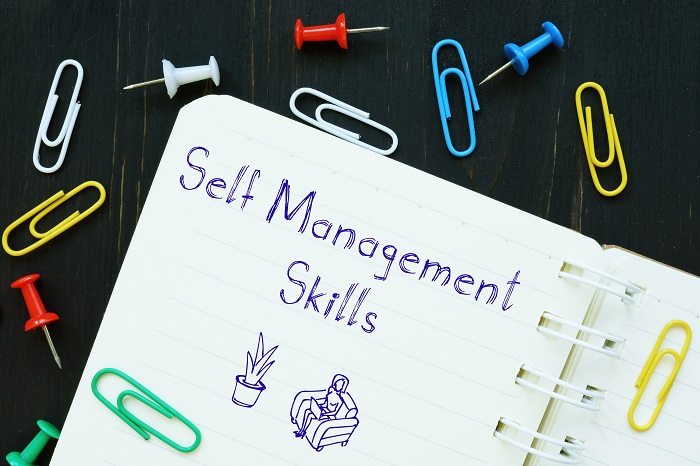
 Data Structure
Data Structure Networking
Networking RDBMS
RDBMS Operating System
Operating System Java
Java MS Excel
MS Excel iOS
iOS HTML
HTML CSS
CSS Android
Android Python
Python C Programming
C Programming C++
C++ C#
C# MongoDB
MongoDB MySQL
MySQL Javascript
Javascript PHP
PHP
- Selected Reading
- UPSC IAS Exams Notes
- Developer's Best Practices
- Questions and Answers
- Effective Resume Writing
- HR Interview Questions
- Computer Glossary
- Who is Who
Mastering the Art of Self-Management
Self-management is a crucial life skill for both the workplace and the home. It entails establishing priorities for your tasks and planning your time to accomplish those priorities. However, self-management can be challenging to master. How can we develop our self-management abilities? We have your back. We'll begin by defining self-management and outlining its significance for a happy, fulfilling existence. Then, we'll discuss ways to improve self-management abilities.

What is Self-Management?
The simplest definition of self-management is the capacity to control one's own actions and feelings. This entails establishing goals, remaining organized, and maintaining a course for reaching those goals. It also entails having efficient stress and challenging circumstance management skills. Self-management abilities enable people to take charge of their actions and accept accountability for the decisions they make, which can benefit both personal and professional lives. Self-awareness and the ability to evaluate one's strengths, limitations, and opportunities for growth are also necessary for someone to fully flourish in self-management.
Why is Self-Management Crucial?
Self-management is essential in both personal and professional settings.
From a personal perspective, self-management enables people to successfully create and attain their own goals. They can manage their time, prioritize their activities, and work on themselves because of it. People can have happy and prosperous lives when they can accept personal responsibility for their deeds and decisions.
Self-management is crucial for career development and advancement in the workplace. It enables people to function effectively and efficiently in a team environment at work. Additionally, self-management enables professionals to take the initiative, address issues, make wise choices, and adjust to new difficulties or changes.
Tips for Enhancing Self-Management
So how does one enhance their capacity for self-management? The following advice ?
Specify Attainable Objectives
Setting clear, attainable goals is among the most crucial things you can do. Ambitious or hazy goals may be challenging to attain and may cause feelings of despair and frustration. Make sure your objectives are measurable, reasonably attainable, and have a time limit. In addition to making it simpler for you to monitor your progress and keep on course, doing this will also make you feel good as you cross each goal off your list.
Make a Detailed Plan for Reaching Those Objectives
Setting goals is crucial to succeeding in self-management. Setting goals alone, however, is insufficient; you also need to have a detailed plan for achieving them.
This entails setting deadlines for finishing each work as well as breaking down larger projects into more manageable chunks. Additionally, it's critical to think about any potential roadblocks or difficulties and develop coping mechanisms for them. Making a sound strategy will improve your chances of achieving your objectives and enhancing your self-management abilities. Avoid feeling overwhelmed by beginning with one specific, doable goal at a time and developing a step-by-step strategy to achieve it. You'll be well on your way to mastering self-management before you know it.
Sort Tasks According to Priority and Urgency
It can be alluring to start working on tasks right away, even if they aren't necessarily important or urgent. However, in the long run, this can result in missed deadlines and incomplete work. Assessing the importance and impact of each activity is the first step in efficient prioritization. Will finishing it help you get closer to your long-term objectives? Is there a firm deadline involved? Make a list or plan and do each activity in sequence once you are certain of its relevance and urgency. This strategy can appear straightforward, yet it has a big impact on time management and overall effectiveness.
Review Your Progress Frequently and Make Adjustments as Required
Without regularly assessing where you are and where you want to be, it's simple to get off course and lose sight of your objectives. You can spot areas where your strategy or priorities need to be adjusted by periodically monitoring your progress, whether it is weekly, monthly, or quarterly. By doing this, you can be sure that all of your time and energy are going toward achieving your main goals. In order to enhance your self-management abilities, be sure to schedule time for reflection and correction on a regular basis.
Maintain Discipline and Refrain from Squandering Time
Exercise of self-discipline is a crucial component of self-management. This entails making priorities and following through on them, despite any temptation to put things off or focus on anything else. Making intelligent decisions about how you spend your time also entails avoiding time-wasting activities like mindless internet browsing and excessive social media scrolling. Self-control requires work and it means making short-term sacrifices for long-term gain, therefore it is not always simple.
Self-Management: A Key to Success
In terms of taking charge of our own behavior and well-being, self-management is by no means a novel idea, and we have all had some experience with it. A healthy, balanced lifestyle depends on learning the art of self-management. Self-management development requires introspection. You need to take an honest, in-depth look at your own emotional intelligence, self-control, and leadership style to figure out how much self-regulation you actually possess.
Although learning self-management is not simple, it is attainable. And it's worthwhile since you'll develop naturally as a leader as your self-management abilities increase. Self-management has several advantages, from the best management techniques to your own personal growth.
Conclusion
We can all get better at self-management, a crucial working skill. After all, we are only human. Spend some time reflecting on your strengths and areas for development in self-management.
You can improve your ability to control your own actions and ideas, which will make you a stronger leader. As you go about your day, be aware of your ideas, aspirations, and emotions, and note which ones you need to work on. The first step toward improvement is admitting that it is necessary.

